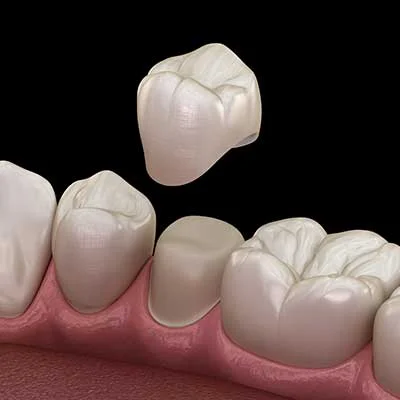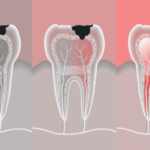Full Guide to Dental Crown

A dental crown is a cap that covers a tooth or an implant post, restoring the normal shape and size of the tooth and allowing full functionality. There are multiple reasons, from tooth decay to damage, that may require getting a dental crown:
- Tooth decay, such as a cavity that has eroded too much of a tooth for a proper filling
- Tooth damage, such as a cracked or broken tooth
- A tooth that has had root canal treatment and now requires a protectant crown
- Part of the dental implant procedure to fill the space from a missing tooth
- Cosmetic improvements to discolored or poorly shaped teeth for a more pleasing smile
Table of Contents
Who is a candidate for a dental crown?
While you may need dental restoration services, not everyone is an appropriate candidate for a dental crown. The following are reasons why you may consider putting a crown on a tooth and some of the circumstances that may prevent you from getting a dental crown:
Tooth Decay
A dental crown may be used to cover a decaying tooth to make it stronger for improved functionality. A tooth with severe decay may be unable to adequately support a dental crown. In this case, the tooth will need to be extracted, and then there are options to fill the space, including a dental implant with an implant crown placed on top.
Damaged Tooth
A cracked or broken tooth may have a dental crown placed on it to restore its original size and provide support for normal function and protection from further damage and infection. A tooth with severe damage may be unable to support a crown and may have root damage as a result of the tooth damage. In this case, the tooth would need to be removed and a dental implant with an implant crown would be the more appropriate option for dental restoration.
Tooth Alignment or Discoloration
Dental crowns can be used on one or more teeth for cosmetic purposes to cover teeth that are disproportionate in size, misaligned, or discolored. With dental crowns, the appearance of your teeth can be improved for a more confident smile.
Missing Tooth
The space from a missing tooth can be filled with a dental implant topped with an implant crown. The implant fills the space, which properly supports adjacent teeth to prevent them from shifting or wearing unevenly and improves tooth function and appearance. To properly support a dental implant, you must have healthy gums and bones. If periodontal disease is present, you will need to have those issues addressed before a dental implant procedure is completed.
Root Canal
After a root canal procedure, a crown must be placed on top of the tooth to keep bacteria from getting inside the tooth and causing infection. If you have a tooth with a broken root that cannot be repaired, the tooth will need to be extracted and space will need to be filled with a dental implant or bridge.
Types of dental crown
There are several types of dental crown constructed of different materials with varying prices. Dental crowns are made from composite resin, ceramic, metal, porcelain, or porcelain and metal combination. Crowns are typically color-matched to your natural teeth for a realistic look and improved appearance. There are considerations when choosing the types of dental crown and material, including the following:
- The location and function of the tooth
- The amount of tooth that is visible when smiling
- The position of the gum tissue
- Your preference, insurance coverage, and budget
Metal crowns, which are sometimes gold in color, are very durable and strong and may be used on back teeth. Because they are less expensive, they sometimes are used on children’s teeth since they will not be on permanent teeth. Crowns made from metal material, even if porcelain is on top of the crown, may cause the gum line to have a gray color where the metal shows through. All-porcelain crowns are used most often for their aesthetic value, but they carry a higher cost. Omega Dental Specialists in Houston Texas, the best dentist in town, can discuss which type of dental crown is appropriate for your needs and budget.
Cost of Dental Crowns in Houston Texas
The cost for a dental crown typically ranges from $1100 to $1500. The variance in price is due to the type of crown being used the involvement of the tooth crown procedure. There are some procedures that may carry additional costs to the normal dental crown placement.
Dental Crown Lengthening
Dental crown lengthening is a surgical procedure where excess gum tissue and sometimes bone are removed to make the teeth look longer or to create a more symmetrical look on an uneven gum line. This procedure is often for cosmetic reasons and may not be covered by insurance; however, in the case of tooth damage or decay, removing some of the gum to expose more of the tooth may be necessary to properly support a dental crown. In this instance, your insurance may cover the crown lengthening cost as part of the necessary preparation for the tooth crown procedure.
Root Canal
The root canal and crown costs are priced separately. The average cost of a root canal ranges from $1000 to $2000, depending on the tooth. The crown needed to protect the tooth after the root canal is priced separately and will be an additional charge to the dental crown procedure.
The cost for dental procedures in Houston Texas, including dental crowns, is in the mid-range compared to national averages. The staff at Omega Dental Specialists can provide more information on the cost of your dental crown as well as the preparation required for successful crown placement.
The Dental Crown Procedure
When you get a dental crown, you should expect two visits with your dentist. The first visit will be to prepare the tooth for the crown and take measurements and impressions to make the crown. The second visit will involve putting a crown on the tooth and properly adjusting and shaping it for a natural fit. The step by step dental crown procedure is as follows:
During the first visit:
- The tooth decay will be removed as well as the outer portion of the tooth to provide room for the crown to fit over the tooth.
- An impression of your teeth is made from a mold and/or digital scan so that the crown can be constructed to fit exactly over the tooth.
- A temporary crown will be placed so that your tooth is properly protected until your permanent crown is constructed. So how long does a crown take to make? It will take only about two weeks for your permanent crown to come in.
During the second visit:
- The temporary crown will be removed, and your permanent crown will be cemented into place.
- The crown will be grinded slightly to align with adjacent teeth and your bite for a natural, comfortable fit.
With two visits required in the step by step dental crown procedure, you may be wondering how long does it take to put a crown on? Fortunately, this second appointment should take only about an hour to cement the dental crown in place and complete the necessary adjustments.
How to Care for Your Dental Crown
Just as your natural teeth can crack or break, so can a crown. Additionally, the tooth under the crown can incur decay and damage like cavities. To care for your dental crown, make sure to practice good oral hygiene that includes brushing your teeth at least two times per day and flossing daily, getting professional cleanings and exams two times per year, and avoiding chewing hard foods like ice and hard candy and sticky foods that may pull off the crown. Furthermore, avoid chewing on hard items or using your teeth as if they are scissors to cut things, and if you are prone to teeth clenching and grinding in your sleep, consider getting a dental guard.
Potential Complications with Your Dental Crown
As with any dental procedure, you may experience an issue with your dental crown. Some possible complications include the following:
Pain: While it is normal to have some discomfort following putting a crown on a tooth, sharp pain or ongoing severe discomfort is not normal. If any pain or discomfort does not subside within a few hours, you should contact the dental office. If the edges of the crown are irritating your gums or adjacent teeth, it may need to be adjusted for a better fit. If the tooth under the dental crown has severe, ongoing pain, it may have experienced trauma during the procedure and need attention.
Heightened Sensitivity: When the tooth is prepared for the dental crown, the outer portion of the tooth that includes the enamel is reduced. The enamel is the protective surface layer of the tooth that prevents external stimuli from irritating the tooth. When that enamel thickness is diminished, you may experience sensitivity from hot and cold liquid and food.
Bite Issues: A dental crown changes the tooth’s shape and size. These changes may cause your bite to shift and be uncomfortable when coming into contact with other teeth. The dental crown can be adjusted and grinded to fit more naturally with the other teeth.
Damage: Your dental crown may crack or damage if not cared for properly or if you experience facial trauma. Additionally, if the cement holding it in place deteriorates or if the tooth it is attached to is insufficient in size, the dental crown may fall off. Be sure to contact your dentist immediately if your crown becomes damaged or falls off.
What is the Lifespan of your Dental Crown
The lifespan of your dental crown is largely dependent on your dental hygiene and overall care of your teeth. Normal wear and tear will erode and weaken dental crowns over time, but with proper dental care and good oral hygiene, your dental crown can last as long as 25 to 30 years or longer. If your dental crown needs to be replaced, most insurance will cover part of the cost if the crown is older than five years.
Omega Dental Specialists is the best dentist in town for all your dental needs in Houston. Give us a call to schedule your consultation to discuss your dental concerns.


